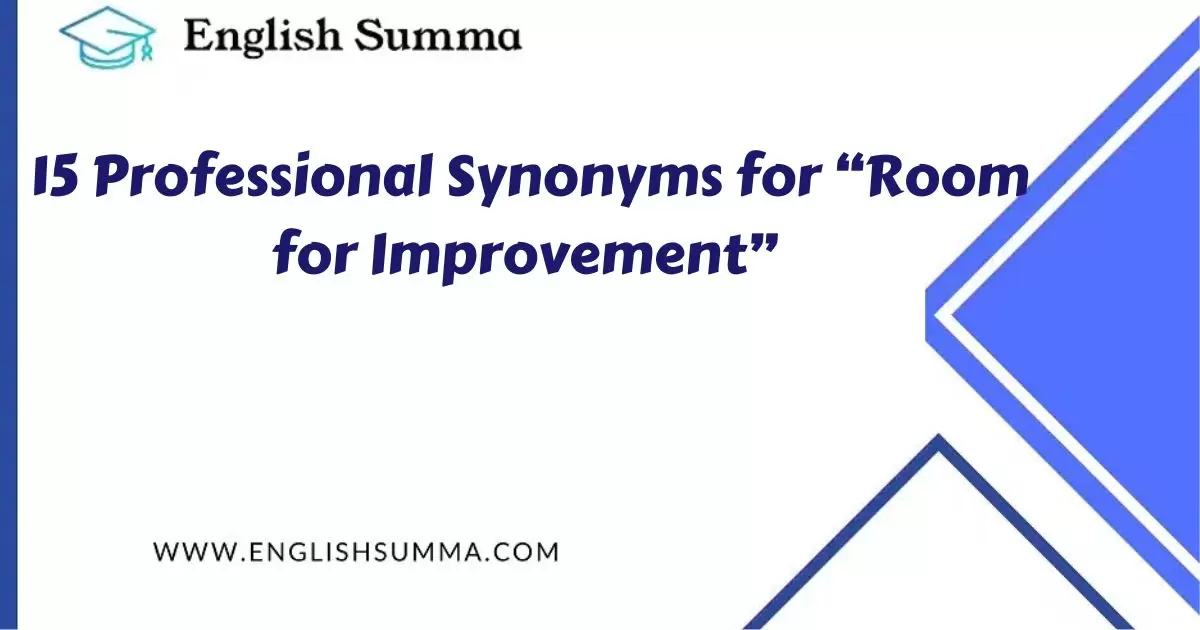In every aspect of life, there is always room for improvement. Whether it’s personal development, professional growth, or organizational advancement, recognizing areas where enhancements can be made is crucial for progress. In this article, we’ll delve into 15 professional synonyms for “room for improvement” and explore how they can be used to convey the need for progress in various scenarios.
1. Opportunity for Enhancement
When addressing opportunities for improvement, it’s essential to frame them as chances for enhancement. For example, in a performance review email to a colleague, you might say, “James, I’ve identified some opportunities for enhancement in our project management processes.”
2. Room for Growth
Expressing the potential for personal or professional growth can inspire individuals to strive for excellence. In a one-on-one meeting with a team member, you could mention, “Justin, I believe there is significant room for growth in your leadership skills.”
3. Potential
Highlighting the potential for improvement can instill optimism and motivation. In a strategic planning document, you might state, “We recognize the potential for increased efficiency in our operations.”
Don’t miss to read out this “Professional Synonyms for “Nice to Connect With You”
4. Area for Progress
Identifying specific areas where progress can be made allows for targeted efforts towards improvement. For instance, in a project update email, you could mention, “We’ve identified marketing as a key area for progress in our campaign strategy.”
5. Space for Development
Emphasizing the need for development creates a supportive environment for skill enhancement. In a training session announcement, you might mention, “We’re creating space for development with a series of workshops on customer service excellence.”
6. Areas for Continued Development
Acknowledging ongoing development underscores the importance of continuous learning and growth. When providing feedback to a team member, you could say, “Your presentation skills are strong, but there are areas for continued development in engaging the audience.”
7. Improvements to be Made
Focusing on specific improvements clarifies the actions needed to progress. In a project status report, you might highlight, “There are several key improvements to be made in our quality control processes.”
8. Capacity for an Upgrade
Describing the situation as an opportunity for an upgrade can inspire innovation and change. In a product development meeting, you could propose, “Let’s explore the capacity for an upgrade to our software interface for a better user experience.”
9. Potential for Optimization
Highlighting the potential for optimization emphasizes efficiency and effectiveness. When discussing workflow improvements, you might suggest, “There’s significant potential for optimization in streamlining our document approval process.”
10. Space for Positive Change
Framing improvements as opportunities for positive change promotes a proactive mindset. In a team brainstorming session, you could encourage, “Let’s identify space for positive change to increase collaboration and innovation.”
11. Opportunity for Enhancement
Addressing opportunities for improvement as chances for enhancement can inspire proactive action and positive change. For example, in a team meeting, you might say, “We have identified several opportunities for enhancement in our customer service procedures.”
12. Space for Development
Emphasizing the need for development creates an environment conducive to learning and growth. In a performance review discussion, you could mention, “There is ample space for development in your project management skills.”
13. Potential
Highlighting the potential for improvement instills optimism and encourages individuals to strive for excellence. When discussing strategic goals, you might emphasize, “We see tremendous potential for growth in our market expansion plans.”
14. Areas for Progress
Identifying specific areas where progress can be made allows for targeted efforts towards improvement. In a project update email, you could state, “We have outlined key areas for progress in our timeline to ensure timely completion.”
15. Prospects for Enhancement
Describing improvement opportunities as prospects for enhancement encourages proactive problem-solving and innovation. In a brainstorming session, you might suggest, “Let’s explore the prospects for enhancement in our product design to meet customer needs more effectively.”
Pros and Cons of Using Professional Synonyms
Pros:
- Enhanced Communication: Using a variety of professional synonyms helps to diversify communication, making it more engaging and impactful.
- Emotional Connection: Professional synonyms allow for expressing gratitude and appreciation in a more heartfelt and meaningful manner, fostering stronger emotional connections.
- Versatility: Having a wide range of professional synonyms at your disposal allows you to adapt your communication style to different situations and audiences.
- Politeness: Professional synonyms convey a sense of politeness and respect, contributing to positive interactions and relationships in the workplace.
- Nuanced Expression: Each synonym carries its own nuances and connotations, allowing for subtle variations in tone and emphasis to be conveyed effectively.
- Personalization: Choosing the right synonym based on the context and recipient enables you to personalize your message, making it more relevant and impactful.
Cons:
- Overuse: Using professional synonyms excessively can come across as insincere or overly formal, diminishing the authenticity of the communication.
- Misinterpretation: Different synonyms may be interpreted differently by individuals, leading to potential misunderstandings or miscommunications.
- Limited Vocabulary: Relying too heavily on a small set of professional synonyms may limit your ability to express yourself fully and creatively.
- Time-Consuming: Constantly searching for the perfect synonym can be time-consuming and may slow down the communication process, especially in fast-paced environments.
- Cultural Sensitivity: Certain synonyms may carry cultural connotations or nuances that may not be universally understood, leading to potential misunderstandings in multicultural workplaces.
- Formality: Using overly formal language may create a barrier between colleagues and hinder open and informal communication, which is sometimes more conducive to collaboration and teamwork.

